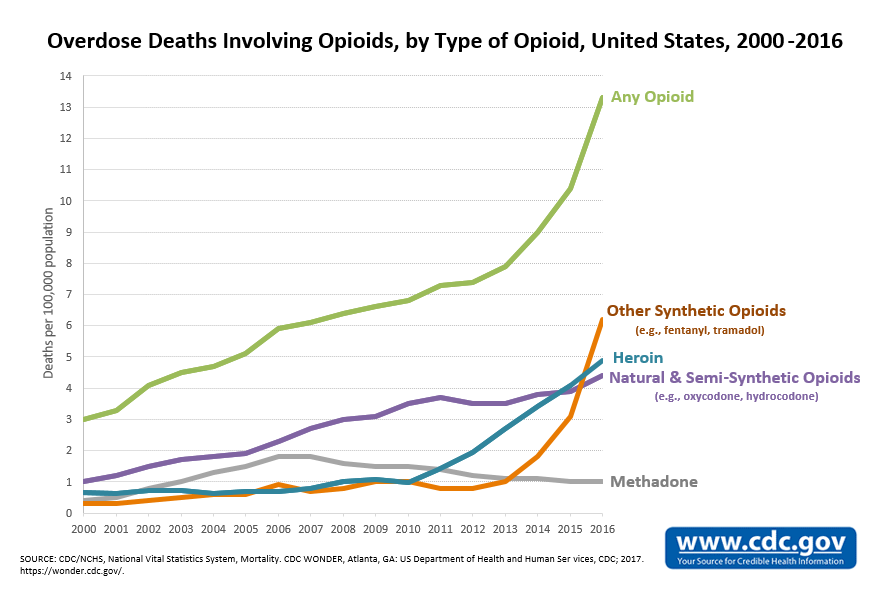What supplements can help you heal from opiate addiction?
The opioid epidemic has been at the forefront of local, state and federal level due to its rapid growth and difficulty to handle. In 2016 over 40,000 deaths were due to opioid overdose, which is almost the same amount as deaths from breast cancer. As you can see below, there has been a sharp increase in overdose deaths in the last few years, which explains the urgency and the need for better treatment options. A very important aspect of recovery is nutrition, as it is crucial to long-term success.

Substance use disorder impacts the body’s nutrition status and changes neurochemistry. Research shows that nutrient deficiency (malnutrition) is a consequence of substance abuse due to poor eating habits, and due to interference with the metabolism of nutrients. Prolonged use of opioids damages the intestinal lining, which impairs the ability to absorb nutrients.
Nutrition deficiencies cause imbalance in hormones, chronic inflammation, pain, anxiety, and depression. For example, many addicts have a calcium and magnesium deficiency, which are major factors in pain and issues in the nervous system. Another common deficiency is B-vitamins and folate deficiency, which has a terrible effect on the digestive system. Deficiencies create cravings and mood changes, and as a result, they create a vicious cycle that makes it difficult to recover.
A healthy diet, high in protein, calcium, magnesium, omega-3 oil, antioxidants and amino acids helps curb the cravings and mood swings. However, due to chronic deficiency, whole foods alone may not be enough to replenish these nutrients. This is where dietary supplements come into play. Bringing nutrient levels back to normal is not only important physically, but they also improve overall wellbeing, better social functioning and a better quality of life.
Dietary Supplements for Opiate Withdrawal
When looking for supplement brands, it’s important to make sure that the product is clean (doesn’t contain any common irritants and allergens, such as lactose or gluten), and that it has a certificate of analysis done by a third party. This ensures that the product is pure and contains the active ingredients it says it does.
Common dietary supplements that help aid opiate addiction recovery include:
GABA
GABA is an amino acid found in the brain and is believed to slow down the firing of the neurons, which in turn helps people feel more relaxed and calm. Research indicates that a major factor in people with anxiety disorders, and people who have become addicted to street drugs, alcohol and medication is that they are most likely suffering from low GABA activity in their brain.
Want to know more about how opioid addiction changes the brain?
Protein powders
Protein helps repair the damage done to tissue and organs due to addiction. When diet is not enough to replenish the nutrients necessary for addiction recovery, protein shakes may provide additional support.
Calcium and Magnesium
They help calm twitches and muscular pain that happens during opioid withdrawal.
B-vitamins
- B-complex helps with the production of neurotransmitters and hormones, helping reduce anxiety and depression. As well as other functions necessary for detoxification.
- B12 supports healthy nerve cells and the elimination of the neurotoxic compound homocysteine.
- B6 (as pyridoxal 5′-phosphate) is a required enzymatic cofactor in numerous metabolicprocesses, including the synthesis of neurotransmitters such as serotonin and dopamine.
Omega-3
Low levels of omega-3s deplete the levels of dopamine in the brain. Dopamine is involved in feelings of pleasure, including getting high. When dopamine levels are low, a person with an addiction will seek more and more drugs to maintain that high. By adding omega-3s supplements (as DHA) during recovery, substance abusers may feel less angry and anxious, which are top contributors to relapse.
Probiotics
Opioid abuse damages the gut lining, which results in malnutrition. Probiotics can help replenish healthy gut flora, aid in the absorption of nutrients, which in turn help the brain recover from addiction.
It’s important to consult with your health care provider, or a pharmacist, before taking any supplements to avoid contraindications and to ensure the right dosage is used.
Additional Tips
Here are a few additional tips to help curb cravings:
- Drink smoothies with fruit, vegetables and protein, such as Greek yogurt or nut butter. Greek yogurt is a good source of probiotics and nut butter provides additional protein to your diet.
- Keeping hard boiled eggs, cheese, yogurt and high-protein foods handy can help with cravings by stabilizing blood sugar.
- Because chronic substance abuse damages the gut lining and causes “leaky gut” and inflammation, eating an anti-inflammatory diet is recommended.








